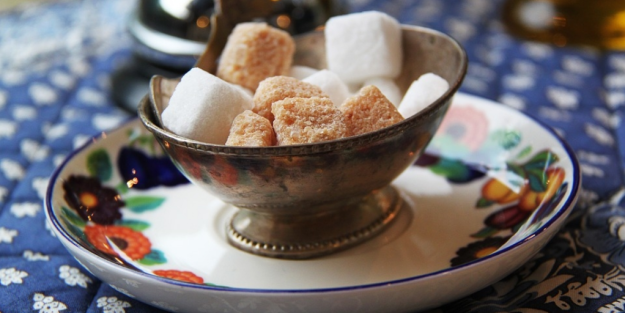I don’t think it’s an exaggeration to say that 2016 took a lot out of all of us. Just about everyone I’ve encountered is banking on 2017 being a lot gentler and kinder. One of the best ways we can each contribute to this is by taking better care of ourselves.
It’s no secret that stress contributes to many of the health problems we face. But what does it mean when we’re told to “de-stress”? Stress is unavoidable in our society. Well, we’ve rounded up our favourite ways to help mitigate that stress, and we’re sharing them with you here.

1. Drink more water.
Stress is not just an emotional thing. Our bodies can experience physical stress, as well. Since we’re mostly water, having less than optimal hydration levels can feel threatening to our bodies. Non-diuretic herbal teas and just plain ol’ water are the best ways to get your water levels up, so try to include at least a few cups of those in your day.

2. Cut down on the coffee.
Yes, I know. Coffee is LIFE! But coffee has some not-so-nice effects on your stress levels and mood. In addition to triggering adrenaline release (which leads to energy crashes later on), and raising your cortisol levels, caffeine blocks your adenosine receptors for 4-6 hours. What does this mean for you? Well, adenosine is a hormone that promotes relaxation and sleep, so that cuppa joe might be keeping you in a stressed out state for longer than your buzz lasts.

3. Balance Your Blood Sugar
The peaks and valleys in your blood sugar levels creates all kinds of stress in your body, and doesn’t do much for your mood, either. If you’re eating something with a lot of sugar, or a high overall carbohydrate content, balance it out by eating something with fibre, protein, or fat (or a combination of all three!) These slow down the release of sugar into your bloodstream, keeping your energy levels and mood more balanced.

4. Don’t Fear the Fat
For years we were told to avoid dietary fat, with research telling us it was to blame for heart disease and obesity. Now we know that isn’t true. But many people still avoid fat like the plague, which isn’t doing them any favours. Fat is important for brain health (including memory and mental health), and is a key factor in the production of hormones. And hormones aren’t limited to estrogen and testosterone, either. Your stress response is controlled by hormones, too.

5. Stop Calorie Restriction
We discussed the importance of fat above. But did you know that 1g of fat contains 9 calories, while 1g each of protein and carbohydrate contains 5 calories? Chances are, if you’re trying to keep your calories under a certain number, you’re drastically limiting your fat intake, as well.
We also know that, to keep your organs functioning well, the average person requires more than 1700 calories/day – 560 of which go to liver function alone. This is well above the typical “weight loss diet” number. How does this tie to stress response? Well, our bodies still function on a very primal level. Calorie restriction stresses our bodies out. We think we’re in the middle of a famine, and our body takes all sorts of precautions to keep us alive. It also creates a “deprivation” mental state, which stresses us out even further.

6. Move Your Body – Within Reason
Movement can be a great way to reduce stress. Even something as simple as a walk around the block can do wonders for your mood. But too much of a good thing can be, well, not a good thing. Exercise, particularly cardio-heavy exercise, can trigger a fight-or-flight response in your body. Basically, your body can confuse running with running for your life from a woolly mammoth. If you’re battling chronic stress, strength based movement may be the choice for you. Yoga, in particular, is good for bringing a little extra zen to your life.

7. Sleep
Easier said than done, I know. It’s a vicious cycle – stress interferes with sleep, and sleep is so important for stress reduction.
If you’re having trouble falling asleep: Start a bedtime routine. Screens off, relaxation on. Meditation helps some people, as does spritzing a little lavender oil on your pillow. If that doesn’t work, we have some great tinctures and teas that help with relaxation. Come in and speak to a staff member about which is right for you.
If you’re having trouble staying asleep: This is most often tied to one of three things.
- Blood Sugar Imbalance – combat this by eating a fat-rich snack (nuts, avocado) before bed. Fat digests slowly, so your blood sugar will stay more stable through the night
- Liver Crankiness – Include bitter foods (arugula, mustard greens) throughout your day, drink some dandelion tea, cut down on alcohol, and start your day with lemon water
- Stress – (Ugh, right?) There is no quick-fix for this one. It will require battling your overall stress levels. Our Orange Naturals Stress tincture has helped many people expedite this process. Talk to a staff member to find out if it’s right for you.

Finding balance is hard. It requires work AND play. Spend time with people who lift you up, give many hugs, and have a wonderful 2017!
About The Author:
Kelly Boaz, CNP
Kelly is a holistic nutritionist, specializing in eating disorder recovery and food freedom. She is also a public speaker (TEDx King St. West, TDSB) and a writer. Learn more about Kelly, and about booking private consultations at kellyboaz.com Twitter: @kelly_boaz Facebook: /KellyBoazDotCom


Pingback: Are You Consuming Too Much Caffeine? Cut Back With These Tips - Moberly Natural Foods